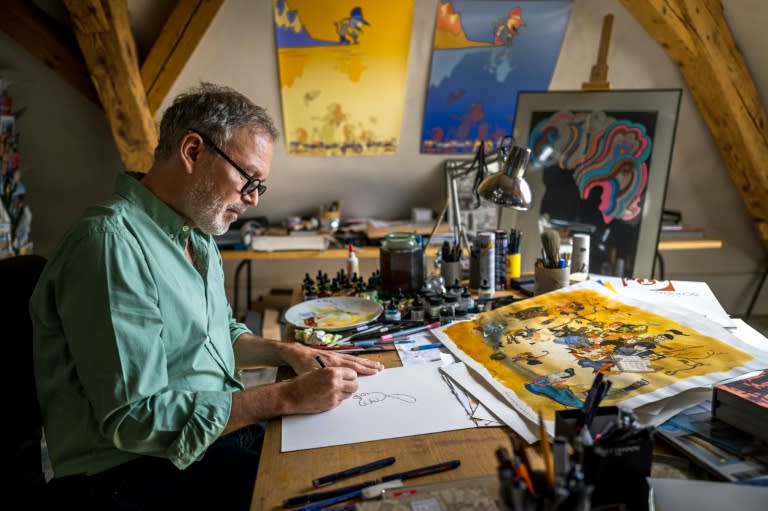Comics king Zep turns from toons to tunes

One of Europe's top cartoonists Philippe Chappuis, better known as Zep, is swapping pencils and brushes for guitars and ukuleles, turning his artistic talents towards folk-pop with an English-language debut album entitled "Automatic Songs".
Chappuis, 56, is behind the Titeuf comic book series -- one of the most popular children's comics in French-speaking countries over the past 30 years.
The Swiss artist took on his pen name Zep aged 12 in a nod to the British rock group Led Zeppelin and, more than just a hobby, music has become "a bit of a second profession", he told AFP.
Music, his "favourite theme", was never far away from his artwork. He has drawn for music festivals, including posters for the Montreux Jazz Festival, and designed album covers for top French singers Jean-Jacques Goldman and Renaud.
- 'Musicality' of English -
In the vast Geneva workshop occupying the top floor of his house, pencils and brushes rest alongside various acoustic and electric guitars.
"I have always mixed music and drawing", said Zep, recalling the numerous groups he has played in since his youth, when he was hooked on the US glam metal band Kiss, with their comic superhero make-up.
"Comics have become my profession and music was always my hobby, but in recent years it has occupied more space", with Zep forming the group The Woohoo with his partner, singer Valerie Martinez.
"I've been drawing it for a very long time too,"he said about his musical passion. "It was the moment to suddenly move to the other side."
The Woohoo's debut album has been out for a few weeks. A great admirer of Bob Dylan, Zep chose to write the lyrics in English.
The artist said he had written humorous parody rock songs in French for years, but with The Woohoo, "I want to go in something more dreamlike or more poetic... I don't want to do Titeuf in song".
"And frankly I think I would have a lot of trouble writing something humorous in English. For me, it is a language that has a musicality that French does not have."
He said Titeuf had been published in 25 languages, noting that the multiple meanings of words in French and the possibility for wordplay therein was "a delight for humorists -- and a nightmare for translators".
- Self-deprecating touch -
A retrospective of Zep's lengthy career is on show at an exhibition in Saint-Maurice Castle in southwest Switzerland.
Zep said he never tires of the adventures of Titeuf, the boy with a feather-shaped cowlick of blond hair.
The series is one of the best-selling comics in France and propelled him to win the grand prize at the 2004 Angouleme International Comics Festival, widely seen as the industry's most illustrious event.
Titeuf was dragged into international controversy when "Willies: a User's Guide" -- a Zep-illustrated 2001 sex education book for children -- was fiercely attacked by Jair Bolsonaro in 2018 during his successful run for the Brazilian presidency.
Rather than strictly a cartoonist or a musician, Zep said he was "an artist who uses the tools he has to hand".
"If I were on a desert island with a hammer and chisel, I think I would learn sculpture!" he said.
He chronicles his musical adventures with The Woohoo in a weekly cartoon for the website of the French edition of Rolling Stone magazine, with a lot of humour and self-deprecation.
- The power of humour -
"We live in a world that takes itself too seriously. Even as adults, we need to keep up or to learn this self-deprecation. This is also what I want to convey through Titeuf," he said, emphasising the importance of humour in easing tensions.
He recalled a drawing he did at age eight that made two rival gangs laugh at school, thereby avoiding a fight.
"I said to myself, there is an incredible power in drawing, with the possibility of making people laugh."
Even today, this power helps him tackle serious subjects such as war or harassment. Ultra-violence among young people is a subject that he would like to address in the next Titeuf album, which he hopes to start soon.
If humour must soothe, it must also spark debates, he said, in the face of current "reactionary movements".
"We must put our foot in the door, and force it a little to open a debate," said Zep.
However, "we must not shock for the sake of shocking".
apo/rjm/nmc/bc

 Yahoo News
Yahoo News 
